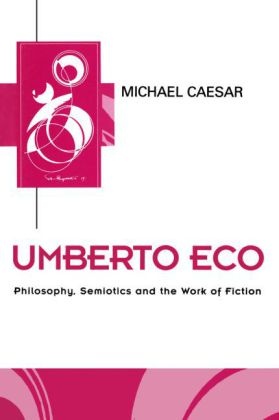Mehr lesen
This book provides a comprehensive introduction to the work and thought of Umberto Eco - one of the most important writers in Europe today.
Inhaltsverzeichnis
Acknowledgement ix
Note on References x
Introduction 1
1 Form, Interpretation and the Open Work 6
On form and interpretation: from Croce to Pareyson 6
Art and rationality 10
The appearance of Opera aperta 15
The poetics of the open work 18
Beyond 'openness' 23
2 A Critical View of Culture: Mass Communications, Politics and the Avant-garde 28
The role of the avant-garde 29
Mass communications and theories of mass culture 37
Television and semiotic guerrilla war 43
Openness and structure 47
3 Introducing the Study of Signs 54
Signals and sense 55
Ambiguity, self-reflexivity and the aesthetic message 64
The critique of iconism 67
Some provisional conclusions on the aesthetic message 69
4 A Theory of Semiotics 76
From La struttura assente to A Theory of Semiotics 76
Communication, code and signification 81
Sign and sign-function 83
Sign production, iconism and the aesthetic message (again) 90
5 Semiotics Bounded and Unbound 100
The boundaries of semiotics 102
The dynamics of semiosis 111
6 Theory and Fiction 120
Readers and worlds Texts 120
7 Secrets, Paranoia and Critical Reading 145
8 Kant, the Platypus and the Horizon 162
Notes 171
Select Bibliography 184
Index 193
Über den Autor / die Autorin
Michael Caesar is Professor of Italian and Head of Italian Studies at the University of Birmingham.
Zusammenfassung
Focuses on the work of Umberto Eco - one of Europe's best-known writers and intellectuals. This title covers the range of Eco's work, from his theoretical writings on semiotics to his best-selling novels. It assesses the influence of Eco's work on contemporary culture.
Bericht
"It is a full, clear and authoritative account of Eco s work, with an emphasis on his development as a theorist and in particular his semiotic theory. But it includes a lively discussion of Eco s novels, which teases out their links with the theory most effectively. It shows the remarkable range and coherence of Eco as a writer, and is notably interesting on the ways in which his ideas have evolved in response to a changing cultural environment. Rich in details, cool, well-paced and incisive, it provides an excellent introduction to, as well as a sympathetic critique of, Eco the thinker." David Robey, Department of Italian Studies, Reading University
"This wonderfully lucid and thorough exposition of Eco s major works will be indispensable to scholars and students alike. Michael Caesar explores the interconnectedness of the theoretical and narrative writings with analytical rigour, balancing appreciation with careful criticism. Caesar makes brilliant use of his own reading of the works to discuss the role of the reader , showing the limits as well as the possibilities in Eco s approach to texts." Robert Lumley, Director of the Centre for Italian Studies, University College, London

